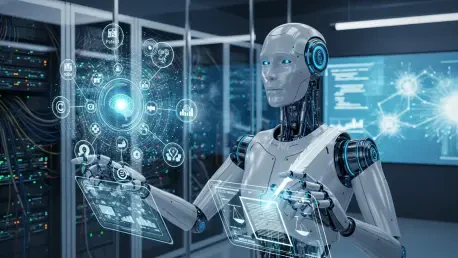With the meteoric rise of Artificial Intelligence (AI), industries worldwide are witnessing unprecedented transformations. Nowhere is this more evident than in Intellectual Property (IP) law, where the traditional frameworks for protecting creative content and innovations are being challenged. As AI technologies become integral to various sectors, they bring to the forefront a critical question—can AI-generated creations be protected under current IP laws? This examination delves into Nigeria’s approach to this evolving landscape, shedding light on the complexities and legal implications of AI-IP interplay.
The Evolving Role of AI in Intellectual Property
In the context of Intellectual Property, AI technology presents a conundrum of ownership and authorship. Traditional IP laws are built upon the principle that inventors and creators, traditionally viewed as humans, possess exclusive rights to protect their outputs. However, AI’s capacity to autonomously generate creative works challenges this perspective. AI’s infiltration into IP-sensitive areas, especially regarding patents and copyrights, has sparked debates about redefining legal boundaries. Stephen Thaler’s global legal battle, seeking recognition for his AI system DABUS as an inventor, epitomizes the current challenges to recognizing AI as a legal entity within IP frameworks.
Nigerian IP law does not explicitly address AI, adhering to traditional concepts of “qualified persons” under copyright acts and patent laws. This human-centric viewpoint signals a need for scrutiny as AI-driven creations become more sophisticated. Legislative measures in regions such as the UK and Ukraine, which still tie authorship to humans directly involved in AI creation, further reinforce this challenge. As a result, the Nigerian legal system finds itself at a pivotal crossroads, trying to reconcile with these nuanced interpretations.
Key Features of AI Impacting IP
AI’s growing capabilities redefine notions of creativity and invention. Through autonomous creation, AI can generate texts, music, and art independently, stirring debates over authorial rights. Traditional IP law, designed for human-centric outputs, faces an overhaul in recognizing the authenticity of these works and protecting such AI-generated content.
Moreover, in data analysis and patent insights, AI revolutionizes the way patent research and management is conducted. By employing machine learning algorithms, AI assists in precise sorting and analyzing extensive patent-related data, making the patent application process more efficient. These capabilities highlight AI’s transformative effect on IP, necessitating a reevaluation of how these technologies align with existing legal principles.
Developments and Applications
Recent advancements in AI technology have introduced new dimensions to IP law. Machine learning innovations continue to influence legal interpretations, enabling courts and policymakers to explore AI’s integration within established frameworks. AI’s adoption in industries such as entertainment, pharmaceuticals, and technology underscores its transformative potential. In entertainment, AI-created music and film scripts push the boundaries of traditional copyright concepts, demanding new regulatory definitions.
Notable AI implementations extend beyond theoretical concepts into practical applications across sectors. Pharmaceutical companies harness AI for drug discovery, improving innovation timelines and fostering IP protections of molecular data shared globally. This technological advancement conveys AI’s power to reshape not only IP practices but also the broader research landscape.
Navigating Challenges in AI and IP
AI’s intersection with IP law reveals significant challenges, both technical and regulatory. A key issue is defining ownership and maintaining ethical boundaries in AI-generated innovations. Current laws echo human-centric perspectives, emphasizing human authorship for creators. Regulatory hurdles require legislative reform and technological advances to accommodate AI’s unique features and its influence on IP rights.
Nigeria addresses these challenges by implementing broad legislative approaches encompassing data protection and consumer rights, indirectly affecting AI governance. Furthermore, initiatives such as the National Artificial Intelligence Policy and the National Artificial Intelligence Strategy showcase Nigeria’s strategic efforts toward robust AI governance, striving to accentuate transparency and ethical growth in the AI sector.
Outlook and Opportunities Ahead
AI’s integration into IP law foretells a landscape ripe with opportunities. Anticipated breakthroughs might redefine IP’s application across sectors, reshaping societal and economic structures. A potential futuristic outlook includes AI systems possessing degrees of protection, and measures evolving beyond legislative adaptations to foster innovation while maintaining a balanced ethical approach.
Strategic frameworks could determine whether AI-driven advancements harmonize with human-centric IP laws or necessitate new legal paradigms. Encouraging dialogue between legal bodies, technologists, and policymakers will be vital in establishing resilient mechanisms to handle AI’s complex intersection with IP.
Concluding Thoughts
The narrative surrounding AI and Intellectual Property in Nigeria is marked by ongoing transformation. AI’s growing role continues to challenge traditional IP laws, urging new interpretations and legislative adaptations. Proactive dialogue and strategic frameworks pave the way for prospective laws that incorporate AI’s distinct attributes, solidifying Nigeria’s standing as a proponent of ethical AI development. The legal landscape evolves, drawing closer to bespoke solutions that honor creators’, developers’, and society’s collaborative interests.









